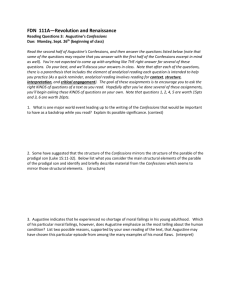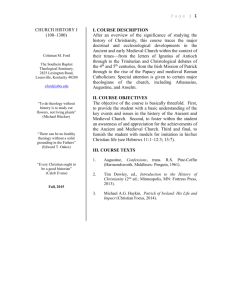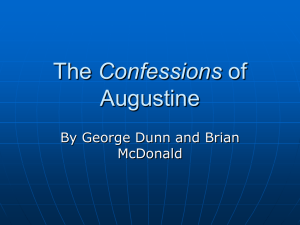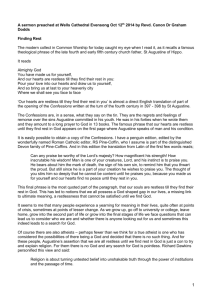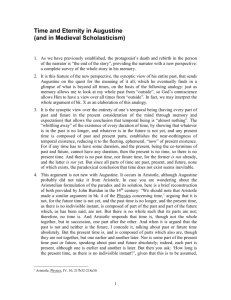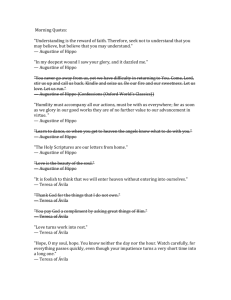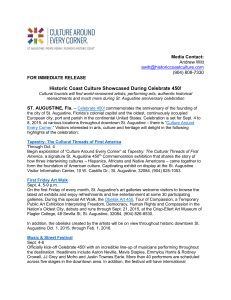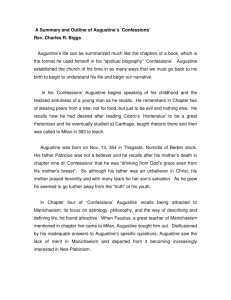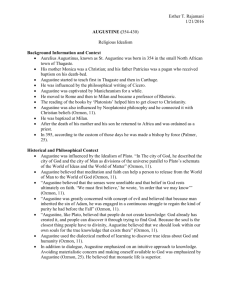ppt
advertisement
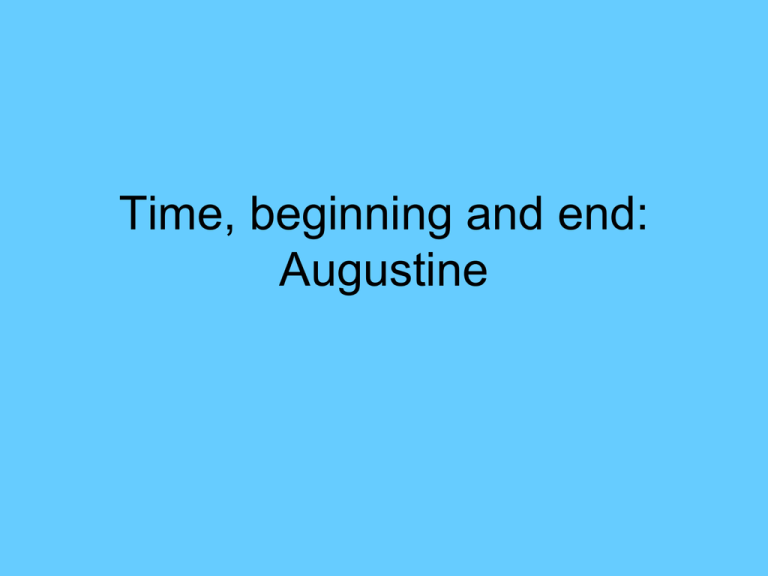
Time, beginning and end: Augustine What we are going to do today: • Paper prompt on the website: CHECK IT OUT! (paper due June 5th) • DSP Note-taker needed: please go to this website http://dsp.sa.ucsb.edu/services • Remember Marc Bloch: Christianity is a historical religion • History and time • Christianity and time • Augustine: the source of many key-concept in western culture • Next Lecture: brief history of time-measuring and Eli’s guest lecture! Before Christianity: the myth of Chronos and the centrality of time Augustine of Hippo (ca 354430) Augustine’s life • 384: professor of rhetoric in Milan • 386: converted to Catholicism, gave up his job and his common-law wife to live in perfect celibacy • 396: appointed Bishop of Hippo • 397: The Confessions • 413-427: The City of God against the Pagans • 430: death • 453: the Western Roman Empire falls The Confessions: why was it so important? • First autobiography in western literature • Reflecting on the past with the ‘telos’ already there: his conversion • Importance of subjectivity • The issue of time: book XI Time and change • (from chaps 3 and 4) ‘..Grant me to hear and understand what is meant by ‘In the beginning You made heaven and earth’…we look upon the heavens and the earth, and they cry aloud that they were made, for they change and vary (If anything was not made and yet exists, there is nothing in it that was not there before: and it is the essence of change and variation that something should be made that was not there before)’ What does that mean? • Change = created • Change is the opposite of eternal, that is, something that was always there • Change is ‘bad’ time: change is death, imperfection, mutability ‘I’m afraid of changing ‘cause I built my life around you’ (‘Landslide’) ‘Bad’ change and ‘good’ learning • From chap.8 ‘When from changing creatures we learn anything, we are led to Truth that does not change: and there we truly learn, as we stand and hear Him and rejoice with joy…for He is the ‘Beginning who also speaks to us’ So… • Humans are ‘creatures’, that is, ‘created’ in time, and therefore imperfect • God is the one who created but who ‘was’ before the World began • WHEN did God create us? When did the beginning begin? What was before the beginning? • From chapter 13: ‘..Thus..it is not in time that You are before all time….your years neither go nor come: but our years come and go…In You today is eternity..You are the Maker of all time, and before all time You are, nor was there ever a time when there was no time’ What does that mean? • God is time-less and is the creator of time • What was time before God created it is a meaningless question, for ‘there was never a time when there was no time’ • What happened before the Big Bang? • Issue of ‘beginning’ and ‘eternity’: is eternity endless time, or is eternity timelessness? ‘ No here after/No beginning/No before/ A pitless nothingness/That reaches deep within (‘Time before the sun’) What is time? (chapter 14) • ‘If one asks me, I know; if I want to explain it to a questioner, I do not know. But ..this much I dare affirm I know: that if nothing passed there would be no past time; if nothing were approaching there would be no future time..but the two times, past and future, how can they be, since the past is no more and the future is not yet? On the other hand, if the present were always present…it would not be time at all…thus we can affirm that time is only in that it tends towards not-being’ What does it mean? • We, creatures of the time-less God but living in time, must try to understand what time is, but we cannot… • Time is what goes away from what is or towards what it is not yet • Martin Heidegger and being-towardsdeath: the existential condition of humans ‘thrown’ in time ‘I sit alone in my dark room/Visions of my life flash before me/Remembering, then thinking, realizing the world has only f**ked me over/And the pain mounts’ (‘My time is yet to come’) Can we at least measure time? • From chapter 27: ‘..let us grant that it could be measured. Now again imagine a voice. It begins to sound and then goes on. Let us measure it, while it is sounding, for when it has ceased to sound, it will be past…what we measure is the interval between some starting point and some conclusion. This means that a sound which is not yet over cannot be measured so that we may say how long or short it is..yet we measure time -not that which is not yet, nor that which is no longer, nor that which has no duration, nor that which lacks beginning and end. Thus it seems that we measure neither time future nor time past nor time present nor time passing: and yet we measure time’ How about some ‘reference point’? • From chapter 24: ‘Would You have me agree with one who said that time is the movement of a body? …if we could note the point of space from which a body in motion comes or the point to which it goes..we should be able to say how much time has elapsed for the movement of the body..[but] since the movement of a body is not the same as our measurement of how long the movement takes, who can fail to see which of these is more deserving of the name of time?’ What does it mean? • We can measure time by measuring something moving in time • But are we really measuring time? • When we say that the day is 24 hours long, are we measuring what time is, or the length of the movement of the sun plotted against some conventional unity of measure? Was Augustine so far off modern-day scientists? • Definition of an atomic second: ‘the duration of 9,192,631,770 periods of the radiation corresponding to the transition between the two hyperfine levels of the ground state of the cesium133 atom’, or, in other words, a multiple number of the cycles of the light emitted by electrons jumping up and down in an atom, in other words, time for physicists is indeed a measure, is it not ‘something’ aside from the reference frame -in this case the atom of cesium The kind of time that Augustine speaks of can be measured…INSIDE! • ‘it is in you, O my mind, that I measure time. Do not bring against me, do not bring against yourself the disorderly throng of your impressions. In you, I say, I measure time. What I measure is the impress produced in you by things as they pass and abiding in you when they have passed: and it is the impress that I measure when I measure time’. So… • Time and timelessness • The timelessness is that of eternity-God • We are creatures of time, but we cannot understand time but in terms of memory and expectation -the past is not here anymore, the future is not here yet, the present is passing between past and future • Can we at least measure time? • We can measure the length of something plotted against some reference point, but we cannot measure ‘time’… …Which means.. • We are creature of time but we seek that which is time-less, we live in time but we cannot measure it, we ‘feel’ time inside but we cannot get it ‘outside’ of ourselves. • The human condition is that of being creatures of time in time, but that of never being able to understand fully what time is aside from our ‘phenomenological’ experience of time. Conclusions • Humans and time: a complex relationship • Time as ‘change’, corruption, death • Time as a way to connect inside/outside which we cannot fully comprehend. Why? • Because, Augustine says, we are prisoners of time but we strive for a time-less return to our time-less ORIGIN • Also, to this kind of time we have to juxtapose the ‘measurable time’, which is not properly ‘time’, but rather the measure of time and the best that we, as humans, can do to ‘arrange’ time

